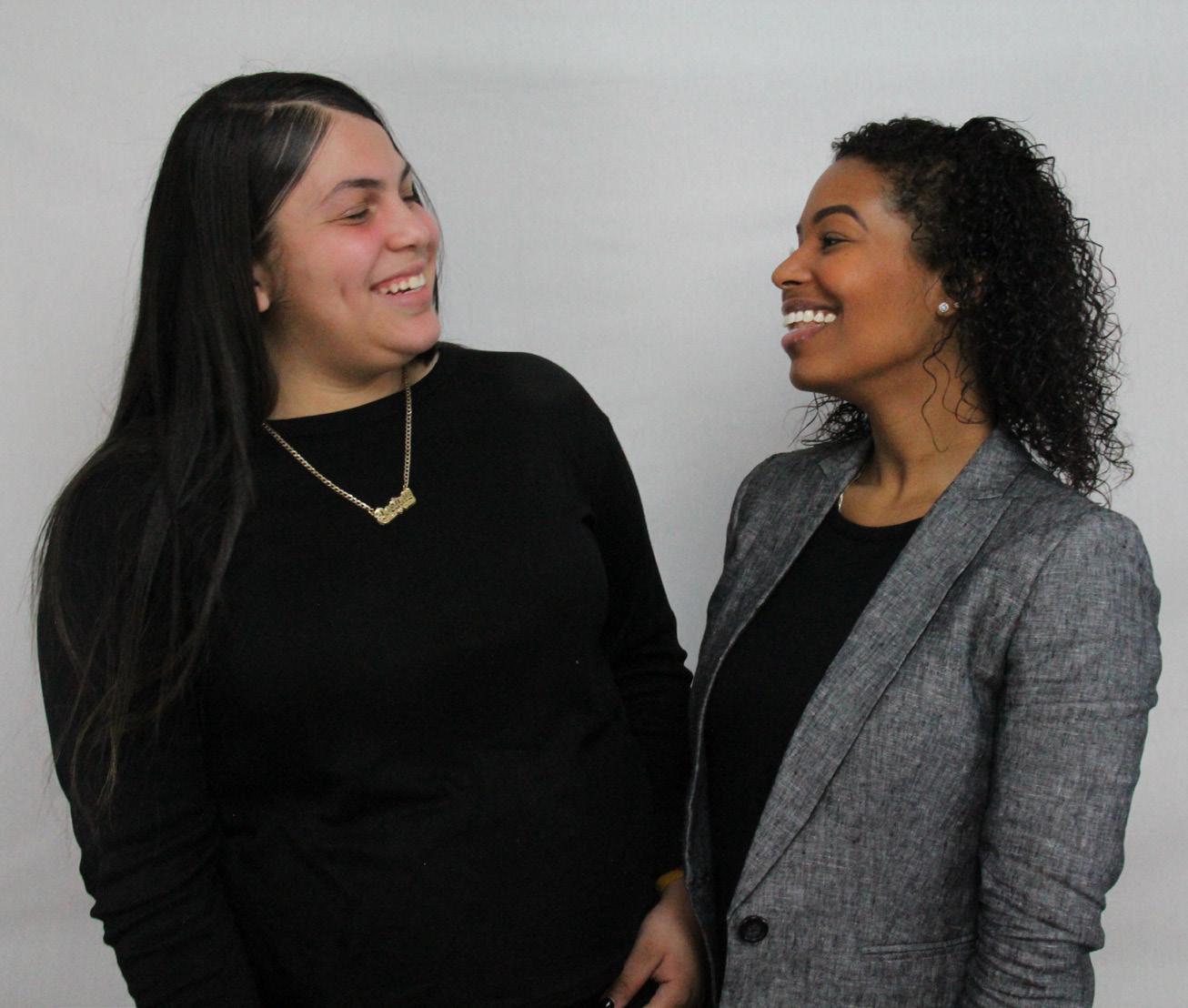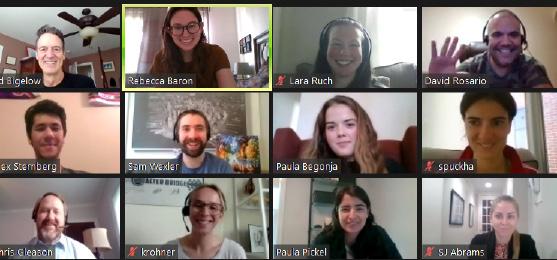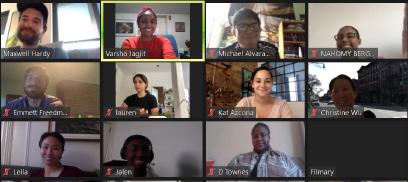
7 minute read
BENEFITS OF MENTORING
As we consider the inequities that already existed and have been exacerbated by COVID-19, employer-based youth mentoring programs have a unique and critical role to play in supporting young people in developing “linking” social capital, which forges connections across power differences and “bridging” social capital, focused on building relationships across the divides (race, class, ethnicity, etc.) that exist in our City28. The private sector in New York City must take a step forward, in partnership with the local policymakers, education leaders and nonprofit organizations, and invest through intentional, mutually beneficial action and direct connection to its future workforce, NYC’s youth. By expanding young people’s access to “resource-rich relationships”,29 particularly among youth of color, an intervention of this kind allows for greater career exploration and success over time.
Investing in youth mentoring through programs like the BBBS of NYC Workplace Mentoring Program offers economic benefit: research concludes that every dollar invested in SEL results in an $11 economic return30 and that supporting a disconnected young adult costs approximately $16,000 per year.31 Conversely, keeping young adults connected and engaged has the potential to generate over $4,000 in New York City and State tax revenues each year.32 Beyond the long-term financial returns, employees at organizations that host mentoring programs report greater job satisfaction and “a more positive perception” of their employer.33
Advertisement
Employees at organizations engaged in mentoring also generate benefit beyond their company walls. In a MENTOR’s 2019 Report “Fueling a Relationship Movement”, researchers found that 72% of employees surveyed at companies where the employer was involved in mentoring were engaged in mentoring in some way as compared to 25% of employees at organization where the employer was not involved or where employees were unsure.34 Additionally, according to the Brookings Metropolitan Policy Program, access to work-based learning that incorporates positive relationships with adults and earlier experiences in the labor market are indicators that youth will achieve career success in their adulthood (Child Trends, 2018).35 This further reinforces that the private sector has an integral role to play in igniting potential.
Leveraging the components of the “developmental relationships” not only benefits youth and their development but also their future employers. “Sharing Power” builds skills like situational judgement, selfassurance and leadership while “Expand Possibility” can involve engaging young people in problem solving to address barriers to success.36 These skills are some of the most sought after and highly prioritized by employers for all candidates, regardless of industry.37 By investing in building these skills through reciprocal, developmental relationships, employers across the City can also better prepare themselves to welcome the next generation into the workforce, learning about their needs, wants, motivations and unique perspectives, thereby positioning themselves as an employer of choice.
Reports indicate that Generation Z is focused on the social values and organizational culture of a company as they make choices about both
employment and consumption.38 This generation is also more aligned with the beliefs and values of Millennials than other, older generations in the workforce.39 With Baby Boomers retiring, Millennials making up 35% of the workforce,40 and the oldest members of Generation Z beginning their careers, New York City industries need to center workforce efforts on learning from younger generations while taking an integral role in directly preparing them to be engaged, employed, active participants in our City’s economy.
Youth Mentoring programs focused on occupational identity formation also present a unique opportunity for New York City’s diverse industries to play an active role in supporting young people in understanding the many options available to them. An extensive survey of over 3,500 youth conducted through the Equitable Futures Initiative, a project of the Bill & Melinda Gates Foundation, found that young people view meaningful connections as a key ingredient to achieving career success (Striving to Thriving, October 2020).41
Recommendations to expand work-based learning experiences that do not include mentoring or focus on relationships as a component are missing a key engagement and impact point.42 Building programming driven by youth needs requires us to be conscious of where they are in their development and to create and shape programming that compliments those needs, this must include meaningful relationships rather than simply skills.
The New York State Education Department’s SEL framework lists “use social awareness and interpersonal skills to establish and maintain positive relationships”43 as a core outcome, and the malleability of mentorship can serve this aim both in remote and in person environments.
Mentoring can continue to meet the needs of youth virtually and hold corporations accountable to reinvesting in the community. It is imperative that we establish policies and programs to align the public, private, and nonprofit sectors. These three-pronged partnerships that align community anchors enable our youth to build a web of relationships that positions them for greater possibility than a siloed, skills focused approach to economic mobility.
The structure of the Big Brothers Big Sisters of New York City Workplace Mentoring Program (BBBS of NYC)
“I was introduced to the BBBS of NYC mentoring program through my company (Deloitte). Three years later, I’ve been matched with two wonderful Littles and without this program, I would feel like something’s missing.”
- Big Sister Katherine

program implements a model that can be scaled across New York City. This threeyear scaffolded program connects NYC DOE enrolled high schoolers, grades 10th – 12th, with employee mentors at corporate partners through a BBBS of NYC facilitated program. Weaving together Positive Youth Development (PYD) principles,44 postsecondary planning and career exploration rooted in the relationship between young people and their mentor presents a unique opportunity for corporations to consider how they can invest in a pipeline of talent during the early stages of their occupational identity formation. The Workplace Mentoring Program is primarily partnered with Center and Technical Education (CTE) schools, connecting concepts to real-life experiences, all with relationships at the center.
Through surveying nearly 1,000 program participants in the Workplace Mentoring Program over a two-year period, BBBS of NYC found that 92% of youth respondents agreed that they learned how to chart a successful career path and 96% of youth respondents stated they learned a skill that will have a long-term impact on their future lives and careers. The data collected from the adult, volunteer mentors illustrates not only their investment in making an immediate impact but their focus on engaging in a relationship that benefits their mentee in the long term: 92.5% of mentors believe they contributed to the future success and development of their Littles and 100% would recommend the program to a friend or colleague. For youth in the BBBS of NYC Workplace Mentoring Program, 99% of 10th and 11th graders are promoted to the next grade, an impressive 98% of high school seniors graduate on time and 99% of those students opt to enroll in college.
An additional benefit of investing in mentoring as a means of promoting career access is that these relationships grow with young people. When built in an intentional way, mentoring has the ability to transcend potential “exit ramps”. Mentors, unlike teachers or other age-bound experiences and programming, can move with young people from grade to grade and provide consistent, adaptable support that meets youth needs through different inflection points in life. We see a demonstration of this with the majority of high school seniors from our Workplace


92% OF MENTORED YOUTH LEARNED HOW TO CHART A SUCCESSFUL CAREER PATH
96% OF MENTORED YOUTH LEARNED A NEW SKILL THAT WILL HAVE A LONG-TERM IMPACT ON THEIR FUTURE LIVES AND CAREERS


Big Brothers Big Sisters of NYC Workplace Place Mentoring Program, Fall 2020
Mentoring Program opting to continue their mentoring relationships through the BBBS of NYC College and Career Success program, which focuses on leveraging the caring, trusting relationship built in high school years towards college persistence and career success.
Work Based Learning (WBL) opportunities like the Workplace Mentoring Program also impact long term job quality, especially for underrepresented youth.45 Through their research, Brookings found that engagement in WBL experiences was “linked to having a higher-quality job at age 30”.46
Focusing on 10th – 12th graders is also developmentally appropriate. Research emphasizes that adolescence is a particularly important time for the formation of occupational identity, given the development of “executive function” during that life stage. Aligning Work Based Learning with this stage of life supports a young person’s readiness to engage in dialogue about their career pathway in a more intentional way.47






